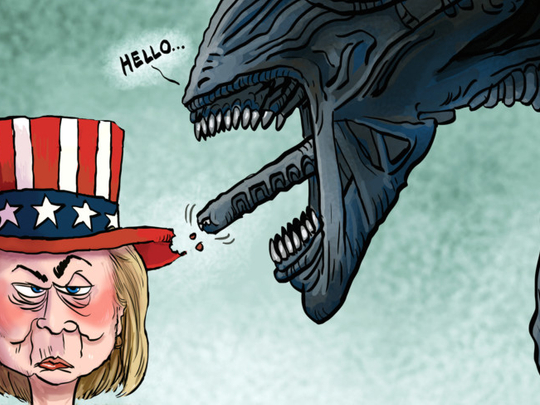
One of the most disturbingly toxic moments in what has already been a disturbingly toxic presidential campaign came last week when, in the wake of the Nice terror attack, Newt Gingrich called for American Muslims to be subjected to a loyalty test.
“Western civilisation is in a war. We should frankly test every person here who is of Muslim background and if they believe in Sharia they should be deported,” the former US House speaker told Fox News. Gingrich later tried to walk back the comments tweeting that media reporting of the kind I just did above — that is, quoting what he said on national television – represented “amazing distortions.”
I’m not going to waste space explaining why such a proposal is self-evidently ignorant and unconstitutional. Instead, I’d like to explore the timing of these comments: what it says about the Republicans as they convene in Cleveland this week to nominate Donald Trump for president, and what the broader reaction to Gingrich says about America’s political class.
Gingrich made his remarks last Thursday evening, US time. At that point Trump had scheduled a news conference to announce his choice for a running mate. Unconfirmed reports were circulating that Trump had settled on Indiana Governor Mike Pence, but nothing had been formally announced. The website Politico reports that Trump wavered over the final decision into the early hours of Friday morning.
So when he spoke to Fox it was reasonable of Gingrich to believe that the job might still be open — or at least that Trump’s mind might still be changeable. Gingrich is shamelessly opportunistic even by the standards of politicians, so his bid to get Trump’s attention by one-upping the businessman’s call for a “total and complete shutdown of Muslims entering the United States” felt crass, but not implausible.
In the end, Pence, not Gingrich, got the nod. Trump first announced his choice in a Tweet Friday afternoon and then appeared in person with Pence in New York on Saturday.
Gingrich’s timing was sad because it revealed one of the Republican party’s most visible leaders, given the narrowest of openings, believing that the best way to win the nominee-to-be’s favour was to outdo him in divisive, bigoted rhetoric.
Disquieting silence
More disturbing, however, was the broader reaction to Gingrich’s proposal — or the lack thereof. Partisan Democrats expressed the requisite outrage while Republicans mostly took it in stride.
That probably should not come as a surprise, since polls show that GOP voters overwhelmingly support Trump’s proposal to prevent Muslims from entering the United States.
More shocking was the lack of attention from America’s largest and most influential media outlets — the ones that still aspire to non-partisan reporting and which still set much of the national media agenda. Most of them seemed to feel Gingrich’s remarks did not merit much attention.
In a particularly disappointing example of this CBS, which prides itself on being the most serious and substantive of America’s major news broadcasters, aired a 15-minute interview with Gingrich on Sunday morning without once asking him about his demand for religiously-based loyalty tests.
I am harping on Gingrich and his comments because, taken as a whole, the incident encapsulates the single most disturbing aspect of this campaign: admitting rhetoric and behaviour into mainstream politics that until recently would have been considered disqualifying.
It is true that we have taken some time to get here. Trump became the nominee by tapping into something that already existed. But acknowledging that he did not create America’s dark side does not excuse his efforts to promote it, enflame it and — most important — give it mainstream respectability or the fact that a shocking portion of the political and media worlds have mostly gone along with this.
This is, in the phrase of the excellent and insightful writer Jonathan Chait, the “normalising of Trump.”
It does not mean that he is going to be president, or that if elected he will actually deliver on his often outlandish promises. Instead, it is a worried acknowledgement that even if Trump loses by a wide margin he is already sweeping away the few rules of civility that still applied in America’s world of non-stop campaigns.
Worse, there is little reason to believe that things will return to ‘normal’ just because Trump loses. If Hillary Clinton wins she will lead a nation where tens of millions of people voted for Trump’s agenda and she will not be able to ignore the demons that Trump unleashed.
Right now it is difficult to avoid the feeling that something fundamental is shifting in American politics. For the moment that might seem to be an exclusively American affair, but on issues from trade to the Iran nuclear deal, from fighting Daesh (the self-proclaimed Islamic State of Iraq and the Levant) to helping overwhelmed Middle Eastern nations cope with the refugee crisis, a small-minded, angry and inward-looking America is not likely to be the sort of partner the rest of the world wants.
Gordon Robison, a longtime Middle East journalist and US political analyst, teaches political science at the University of Vermont.










